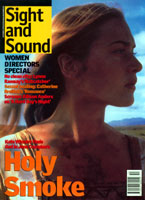Primary navigation

UK 1998
Reviewed by Mark Sinker
Our synopses give away the plot in full, including surprise twists.
London, the present. Rix, Bobby and Bean make experimental jazz-jungle music. Their manager Sam, Bobby's lover, is trying to get them a deal. Sam's uncle Henry who's in music business will only take them seriously - as a band called GMT - if they get a vocalist. Sam thinks they should, but the others aren't interested. Bean has a fling with Bobby's work chum Rachel. The band's schoolfriend Charlie crashes his motorbike and is paralysed from the neck down. Bean and Sam argue bitterly over the direction of the band, and Bean walks out.
Sam sets up recording sessions with vocalist Iona. Rix works reluctantly with Iona, but Bobby leaves the band. Bean becomes a drug-runner for dealer Ellroy. Sam and Rachel become lovers. After talking to Bean, Rix discovers Sam has lied to him. He confronts Sam; learning of his lies, Rachel dumps Sam. An angry yardie boss confronts Ellroy over missing money: Ellroy blames Bean and brings him to the yardie boss' club. Newly signed, GMT give a triumphant show at the same club: Bobby, Rachel, Charlie and Bean all arrive to show support. During a fight for a gun, the yardie boss, his goon and Ellroy are killed. The next day, Bean and Sam arrive simultaneously at Rachel's workplace. Bean pulls a gun, and the police are called. Bean deliberately makes the police gun him down. The surviving friends take his ashes to the Irish beach he always dreamed of visiting.
Guy Sigsworth's music is vastly the strongest thing in Greenwich Mean Time, a coming-of-age tragedy about making it in the pop world, and the trumpetwork Lester Bowie provides, as stuntlips for the Bean character, is a key to this strength. So it's perhaps perverse to argue that they hired the wrong Bowie; GMT would be better - stranger, truer, funnier - if David Bowie, in his current incarnation as clownish BritArt technopixie, had been asked to revive the role he played in Absolute Beginners, slick pop entrepreneur Vendice Partners. GMT's unwise attempt to shoehorn a television-realist 90s (yardies, quadriplegia, Talvin Singh, Canary Wharf) into a treatment of the entertainment industry that's pure Colin MacInnes c.1958 might just have worked if it had given itself some consciously playful cartoon elements. As it is, there's no pirate radio, no DJ magazines, no listings-mag guides to hip club arcana here. Just a camp uncle in the biz, whose opinions about jungle are well square, daddio. Expresso Bongo with crack dens - but without self-awareness.
In fact, somewhere in this mess, a critique is being attempted, of adolescent attitude as unearned cool: GMT would love to believe itself wise to the contradictions and callow perils of 'not selling out'. Certainly those male characters most given to no-compromise moralising - Bean, Rix, Charlie - endlessly throw immature tantrums, while Sam the manager-manipulator is on the whole proved right, despite himself, about how life works, and how to stop it sucking. Of course, he's also castigated for using Charlie's accident to win an argument with Bean, as if the plot isn't busy using the accident to win arguments with us.
But any such examination of why and when people should compromise - and what makes bastards bastards - is lost in a heavily overstocked plot. Knock-off MacInnes idealism, yardie cliché and hospital-ward histrionics swirl about, until no one storyshaper - writer, director, cinematographer, composer - can recall what the others are aiming for. Writer Simon Mirren in particular seems mesmerised by his own cleverness: too often his script, in self-indulgent pre-emptive compensation, requires weak inter-character banter to be followed by bouts of laughter on-screen, while the audience is unmoved. As for Mirren's sextalk, if only its thudding bravado were hipping us to the anxieties that can afflict even the cute and hardbodied; instead it merely broadcasts, even less subtly than usual, youth culture's boastful self-image of its own expressive freedoms and capable bed-hopping.
Indeed, grown-ups in GMT are goofy wallpaper at best, a hoary pop-cultural trope that kills dead any imagined critique of youth cool. Weirdly, this point too is made, but not until over the closing credits, where snaps of the unknown public, at a race meeting and a wedding, exhibit the unscripted dignity and energetic invention which iD magazine explored, in its long-vanished radical salad days: when it knew that 'street style' meant how people on the street, young and old, chose to look and behave. (This striking stills photography appears to be that of Jonathan Olley, stuntlens on behalf of the Charlie character.)
Meanwhile, back at the film proper, director John Strickland casts fashion-plate faces and shoots them in glib, forced transactions. The idea that these fingers, lips, brains or cheekbones contributed to the alert, adaptive, self-mocking GMT sound is often dizzily implausible. GMT's music has integrity - as the script doggedly requires and Sigsworth triumphantly delivers - largely because it dispenses with heart-tugging cliché. If only the script knew how to achieve this: true, I laughed aloud when Bean at last arrived on the dreamed-of Irish beach where his mother's ashes lie, but this time I don't believe I was meant to.